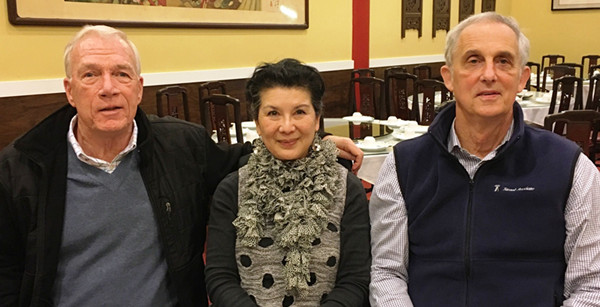 |
|
Former Boston Globe Spotlight Team editor Walter "Robby" Robinson (L) reunites with former Globe colleagues Manli Ho and John B. Wood (R) in San Francisco last month.[Photo provided to China Daily] |
Former China Daily journalists catch up with Boston Globe colleagues who found fame with Spotlight.
"Spotlight", the movie named after the Boston Globe’s Pulitzer Prize-winning investigative team that in the early 2000’s wrote an explosive series on child sexual abuse within the Roman Catholic Church and its attendant cover-up, was a surprise winner at this year’s Academy Awards. But that was not the only surprise.
Who could imagine that a story about shoe leather journalism, about the drudgery of digging for facts and knocking on doors, about the tedium of finding and poring over thousands of documents, could be depicted with such authenticity and yet be such an immersive and moving experience?
Certainly not the members of the Spotlight Team, who, when approached by the filmmakers, wondered how a film could be made about a decidedly unglamorous process. "It would be like a film about how sausage is made", Walter "Robby" Robinson, the then head of the Spotlight Team, recalled recently.
But since then, Robby Robinson and his colleagues "have been struck by lightening", as he put it. For journalists, this well-deserved paean to the professional ethos of a vocation which has been losing ground to the instant gratification Internet age is bittersweet.
For us, this film is particularly meaningful because we had both worked at the Boston Globe. We and Robby Robinson came to the Globe during the heyday of print journalism, an era when the Washington Post’s Watergate investigations had created aspirations in every young reporter to become a Woodward and Bernstein.
The Globe Spotlight Team was formed in 1970, modeled after the Times of London’s Insight Team to do investigations and to shine a "spotlight" into dark corners. Their reporters were not subject to a daily deadline, would take months to conduct their investigations, did not talk about what they were working on and were set apart from the rest of the newsroom, thus creating a somewhat mysterious aura. The stories they filed had to adhere to the strictures of journalistic discipline and ethics; they had to be airtight.
By necessity, the reporters assigned to the Spotlight Team were not the flamboyant stars of the newsroom, nor the competitive self-promoters who needed to see their bylines on the front page every day. Instead, they had to be the solid, dogged, relentless, journeymen reporters, willing to go dark for months on end, and whose egos would not get in the way of the story.
Even so, it took a confluence of time and events - when sexual abuse was no longer a hidden crime, and the fresh perspective of a new editor who was an outsider - for this story to break. It also took courage to continue to pull at the dangling thread that unraveled the whole piece of cloth, because unlike political or civic institutions, the Catholic Church had exercised centuries of moral authority over generations of the faithful who were raised to believe that it was the voice of God. Although the filmmakers made a valiant effort to show the pervasive hold that the Church had in Boston, and to show the Catholic backgrounds of some of the reporters themselves, it is just not possible to feel the depth of its grip in largely Catholic strongholds like Boston, unless one had seen it firsthand.
Even non-Catholics felt the powerful culture of the church. One small example: in 1975, one of us, Manli, wrote a full page feature story on life at a Catholic convent. Permission had to be obtained from the Archdiocese of Boston for a reporter to spend three days in the convent and to interview the cloistered nuns who received a special dispensation to break their vow of silence. After the story hit print, it engendered a delirious response, both in the newsroom and in the community at large, carrying an impact that to us seemed so astonishingly outsized, even overshadowing other more serious newsworthy stories. Several readers even wrote in to admonish Manli for writing that it seemed a shame that no one else would be in the convent chapel to hear the beautiful ethereal singing of the praying nuns at dawn every day. "God hears them", one reader wrote.
At the time, a fellow reporter praised Manli’s writing style, because he claimed, he wrote "AP moron style" in reference to the utilitarian wire service language used by the Associated Press. That reporter was Robby Robinson.
|
|
|
|
|
|
|
|
